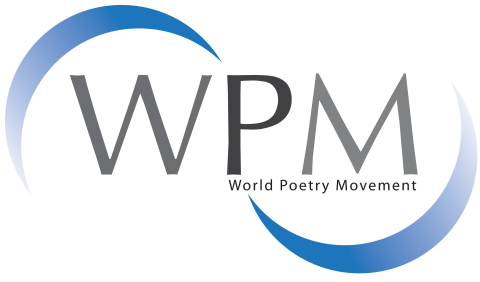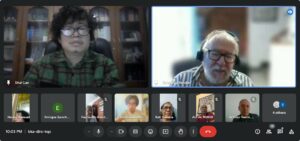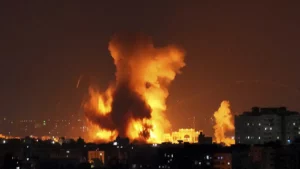The second Boao International Poetry Festival was held from October 16 to 19, 2020 in Hainan, China. More than 60 Chinese and foreign poets, critics and translators attended the festival, including Ye Yanbin, Mei Guoyun, Xu Jingya, Chen Zhongyi, Che Yangao, Irina Chidonova, Podareva Anastasia, Han Qingcheng, Lai Tingjie Shu Cai and Cao Shui.
At 2:30 p.m. on October 17, the opening ceremony of the second Boao International Poetry Festival was held in Dongyu Hall on the first floor of Boao Forum for Asia International Conference Center. The opening ceremony was presided over by Han Qingcheng, Secretary General of Boao International Poetry Festival. He first conveyed greetings to Chinese and foreign poets from Huang Yaya, chairman of Boao International Poetry Festival and former vice chairman of China Writers Association, who was unable to attend the festival due to temporary important affairs. Mei Guoyun, chairman of Hainan writers’ Association, and David, assistant president of China Poetry Society, delivered welcome speeches respectively. In his speech, Mei Guoyun welcomed Chinese and foreign poets to Hainan, and congratulated the Boao International Poetry Festival on their successful holding in Hainan for three consecutive years. On behalf of the Hainan Writers Association, he welcomed many Chinese and foreign poets and writers to Hainan to become Hainan Islanders. He offered suggestions for Hainan’s cultural construction and literary development, further promoted Hainan’s international literary exchange, and built Hainan into a new highland for international exchange and cooperation of Chinese literature.
After the opening ceremony, the third Boao International Poetry Award ceremony was held. Chen Zhongyi, judge of the third Boao International Poetry Award and professor of Xiamen City University, announced the list of winners and congratulated the winning poets. Xu Jingya, judge of the third Boao International Poetry award and professor of the poetics center of Hainan University, read out the award reason of Fernando Rendon, the winner of the Outstanding Achievement Award, and presented prizes to Poet Cao Shui, the representative of Fernando Rendon and the Chinese translator of his works, together with President Mei Guoyun. Cao Shui read out Fernando Rendon’s speech in Chinese and English. In his speech, Fernando Rendon said:want to thank from my heart the generous award of the Boao International Poetry Award for Outstanding Achievement. In my poems, there is a deep drive of my being, of my life, the ancestral memory of myths, the resistance of the present and the dream and the vigorous hope for the future reside equally. I have a deep confidence in the destiny of humanity. Poetry is a fine and natural tissue of words and images that reflects the lives of all and the life of the natural elements, all of which cannot be preserved except in their pure and natural state.I feel very proud and happy to receive this Award that is so important to my life at the present time, and I want to say that I receive this recognition as a tribute to the Medellin International Poetry Festival, to Colombian and Latin American poetry, to the courageous struggle of the Colombian people for freedom and democracy and for the resistance of the human spirit in the most difficult time of world circumstances.The Chinese poets and the people of China are a paradigm for humanity, their deep spirit of solidarity and their contribution to the cause of existence, to the defense of all living beings, return to all humanity the certainty in a secure future, fair and full of poetic sense. So I must sincerely say to you, thank you for your generous solidarity, thank you for awarding me the International Poetry Award for Outstanding Achievement, thank you for your deep friendship.
Che Yangao, executive director of the Organizing Committee of the 2nd Boao International Poetry Festival, read out the award reason of Ye Yanbin, the winner of the Outstanding Achievement Award, and presented the award together with Professor Chen Zhongyi. Ye Yanbin delivered an impromptu speech. He said: I have participated in and presided over many poetry awards, but it seems that the number of votes won by all the candidates has not been announced like the Boao International Poetry award. In my opinion, as a folk award, the judges of Boao International Poetry award are professional, and the selection process is transparent and fair. Therefore, I would like to express my respect to so many outstanding poets who are engaged in folk activities and award this award to me. In this era, especially in the year of COVID pandemic, the poets expressed to the world with their own humble voices that life is precious, that tomorrow can be won, and that every dawn will come. I think it is particularly meaningful to set up a poetry award in Boao, because at the beginning of its birth, Boao Forum is an international platform, a platform for dialogue, exchange and mutual integration, on which poetry is indispensable. Thank you to all the judges. Thank you all. In such a season, we gather here to show that our hearts are united. In another month, I will be 72 years old. I feel that winning this award is a kind of praise for my efforts in the first half of my life. It gives me confidence to continue to write poems that make the world and everyone satisfied.
David, executive director of the Organizing Committee of Boao International Poetry Festival, Yan Xi, Deputy Secretary General of the China Association for Cultural Management, Sansejin, deputy editor in chief of Yanhe poetry magazine, Yu Nong, President of World Poetry magazine, Xu Jingya, honorary director of the Organizing Committee of Boao International Poetry Festival, and Nan Ou, President of Guizhou Poetry Society, read the award reasons respectively and presented awards to the winners of the Poet Award of the Year Russian poet Irina Chidonova, Chilean poet Roberto Aedo, Chinese poets Chen Xiaoman, Huang Fan, Lu Jian and Wang Fangwen.
Luo Luo, vice president of Xiangshan University of Arts; Chen Zhongyi, Professor of Xiamen City University; Zhao Jinzhong, professor of Lingnan Normal University; Yang Siping, professor of Anhui Normal University; Wang Guilin, deputy editor in chief of Yanhe poetry magazine; Lu Jian, Professor of Communication University of China, respectively read out the award reasons and and presented the award to winners of the Poetry Collection of the Year Award Polish poet Adam Zagajewski, Chinese poet Ai Zi, Italian poet Laura Bellotti, Chinese poets Shu Cai, Ma Lei and Cao Bo.
Lai Tingjie, President of Hong Kong Chinese Poetry Institute; AI Zi, vice chairman of Hainan writers’ Association; Peng Tong, executive vice chairman of Haikou Writers’ Association; Shuai Zhongping, chairman of Ningguo literary and Art Federation; Huang Fan, professor of Nanjing University of Science and Technology; Shu Cai, researcher of the Institute of Foreign Languages of the Chinese Academy of Social Sciences, read out the award reasons respectively and presented the award to the winners of the New Talent of the Year Award German poet Jonas Linnebank, Chinese poet Yu Tui, Algerian poet Abdel Kadir kechida, Russian poet Podareva Anastasia, Chinese poet Ming Yang and Tang Jiu.
The award-winning poets made an speech respectively. Affected by the quarantine control during the outbreak of the COVID epidemic, many foreign poets failed to come to China to receive the awards and sent their written acceptance speeches. The winner of the poet of the year, Chilean poet Robert Aedo, Italian poet Laura Belotti, winner of the Poetry Collection of the Year Award, and German poet Jonas Linnebank, winner of New Talent of the Year Award German poet, also sent a video specially recorded for the award speech. The organizing committee broadcast the video on large screen TV and translated it into Chinese simultaneously by Cao Shui.
Roberto Aedo said in the video speech:When I was a little boy, adults used to say to children that if one digs a hole deep enough you will get not to the center of the Earth, but to China, the complete opposite side of the world. However, in a certain way, this was not all fantasies, a simple story made to stimulate children’s imagination: as you probably know, the literal meaning of China (Zhōngguó) is “Central State”, so maybe the story of my childhood was not just referring to the physical center of the planet Earth, but to one of the most important centers in the cultural history of the world. I wanted to start this short speech with this image and a little reflection, because I want you to know why it is really a great honor to receive a poetry award in China. For me, contact with China is a way to come back and get in touch with some of the roots beyond (or behind) my own roots as a Chilean and Latinoamerican man, but also as a poet. Even though I proudly write in Cervantes’s language, falling in love with Tang Dynasty’s poets such as Wang Wei, Li Bai, Du Fu, and Bai Juyi, with Lao Zi and Zhuang Zi.Before getting there, I was already aware of some of the main contemporary heirs of Chinese poetry tradition (Bei-Dao, Yu Jian, Gu Cheng, Xi Chuan, among others), but there I met in person some others like Xiao Xiao and Jidi Majia (or Mo Yan in prose), and some of the younger ones such as Li Hao, Yang Biwei, and Cao Shui. And speaking about Cao Shui: in China I put his Lyric of Babel into Spanish, now in Chile I’m translating his Flowers of Empire. When I was a little boy, adults used to say to children that if one digs a hole deep enough you will not get to the center of the Earth, but to China. However, in a certain way, as an adult I did it, and although because these quarantine times I’m not able to be there with you all in person, I continue writing a poetry collection about my Chinese experience, reading poetry and translating, and I have to confess that it has been even better —much better— than what I imagined and expected as a child.
Laura Bellotti said in the video speech:If on the one hand it is an appreciation towards my writing and the value of my work; on the other hand on a personal level I see it as a prize to a life path, as this book encloses a part of my life. As a poetry writer, what leads me to write is something very intimate: are not only emotions and feelings, the poetry is born from a “soul vibration”, this is the most comprehensive description I can give it. In the verse contained in this book I tried to condense experiences made first-hand by me and my partner, and human values that guided our life journey. Sometimes, life is fraught with difficulties and heaviness, but the strength given by a genuine and reciprocal love filled with respect and dignity allows to overcome any obstacle. I got the chance and the privilege to meet some extraordinarily-ordinary people and I decided to dedicate them the second part of the book. In their ordinariness they have proved and are continuing to prove an uncommon power. I just called them “heroes” as in each of their lives we can find noble examples of human values: Respect for life and for people, dignity, courage, faithfulness, loyalty and real love.
Jonas Linnebank said in the video speech:People who write know that it is already a somewhat difficult task to transfer thought from one person to another, even if you speak the same language. Translating, then, seems an almost impossible task when you muse about what is actually happening there: thinking what another person thought in one’s own words with the help of the (maybe foreign and strange) words of this other person or vice versa and to finally write it down anew, re-formulating, re-writing it.
“Poems are bullshit
unless they teach;
they serve absolutely no purpose
unless they reach
someone.”
These are some of my favourite lines of contemporary poetry, written my TJ Dema in her Neon Poem. They go beyond the simple assertion that poetry doesn’t serve any purpose but itself. They go beyond the idea that poems may be read or heard, that poems may be understood, that they may go beyond one’s self but that they must be read or heard, that they must be understood, that they must go beyond themselves.
Then, the third International Micro Poetry Award ceremony was held. The third “International Micro Poetry Award” was announced a few days ago after 17 judges of the third international micro poetry competition voted in public. Ye Niu’s “Pigeon Opens the Scriptures for the Sky” won the Platinum Writer Award with the highest vote of 9 votes; Haizi Youxi’s “Several Drying Methods for a Wet Clothes”; Gudu Dayan’s “Lines” won the Gold Writer Award with 8 votes, Umut Yalim’s Lancet, Hua Xinfeng’s Autumn River and Su Feng’s Brothers won the Silver Writer Award with 7 votes.
At the end of the award ceremony, the first publication ceremony of “Chinese Poetry in the 21st Century” series was held, and the opening ceremony of World Poetry magazine and Chinese editorial department was held. At 6:00 p.m., the opening ceremony entered the final stage of the signing of “International Poets Series”. The Uncertain Relationship Between Poetry and Poets is a bilingual collection of poems, translated by Huang Shaozheng, a famous translator. AI Zi, the author of poetry anthology and a famous poet, signed for sale on the spot. The awarding ceremony of the 2nd Boao International Poetry Festival was successfully concluded.




